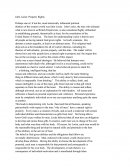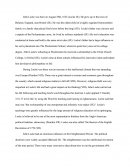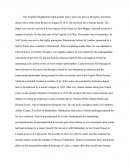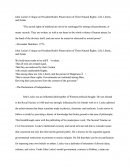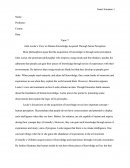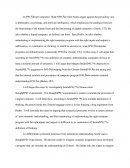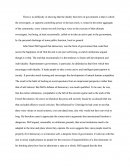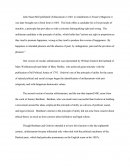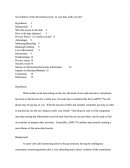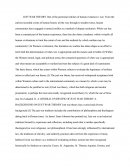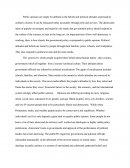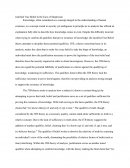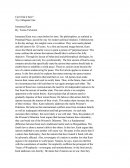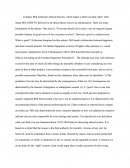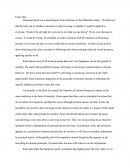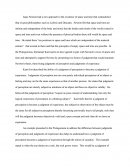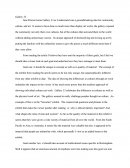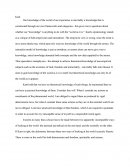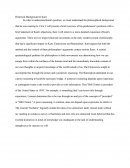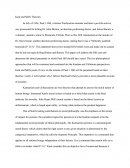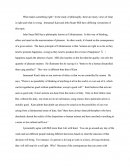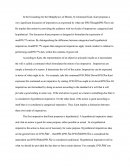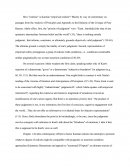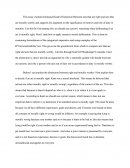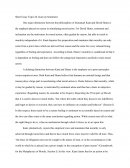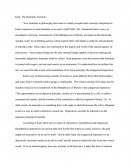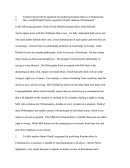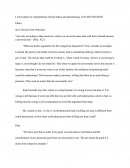Philosophy
There are many popular essays and research papers on Philosophy on Essays24.com.
You can view research papers and essays or use search engine.
1,165 Philosophy Free Essays: 511 - 540
-
John Locke
John Locke: Property Rights Perhaps one of, if not the, most historically influential political thinkers of the western world was John Locke. John Locke, the man who initiated what is now known as British Empiricism, is also considered highly influential in establishing grounds, theoretically at least, for the constitution of
Rating:Words: 1,971 • Pages: 8 -
John Locke
John Locke was born on August 29th, 1632 (Locke IX). He grew up in the town of Beluton, England, near Bristol (IX). He was the oldest child of a highly regarded Somersetshire family in a family that placed God's laws before the king's (IX). Locke's father was a lawyer and
Rating:Words: 973 • Pages: 4 -
John Locke
The English Enlightenment philosopher John Locke was born in Wrington, Somerset, about twelve miles from Bristol on August 29,1632. He was born into a Puritan family. His father was a lawyer and clerk to the Justices of the Peace in Chew Magna, who had served as a captain of cavalry
Rating:Words: 1,562 • Pages: 7 -
John Locke's Critique On President Bush's Preservation Of Three Natural Rights: Life, Liberty, And Estate
John Locke's Critique on President Bush's Preservation of Three Natural Rights: Life, Liberty, and Estate "The sacred rights of mankind are not to be rummaged for among old parchments, or musty records. They are written, as with a sun beam in the whole volume of human nature, by the hand
Rating:Words: 1,823 • Pages: 8 -
John Locke’s View on Human Knowledge Acquired Through Sense Perception
Insert Surname Name: Professor: Course: Date: Topic 7 John Locke’s View on Human Knowledge Acquired Through Sense Perception Most philosophers argue that the acquisition of knowledge is through sense perception. John Locke, the prominent philosopher who inspires young minds and free thinkers, teaches his adherents that people can gain their
Rating:Words: 604 • Pages: 3 -
John Searle
In “Can Computers Think?” John Searle argues against the prevailing view in philosophy, psychology, and artificial intelligence, which emphasizes the analogies between the functioning of the human brain and the functioning of digital computers. (Searle, 372) He asks whether a digital computer, as defined, can think. Specifically, he asks whether
Rating:Words: 1,502 • Pages: 7 -
John Staurt Mill - Electronic Democracy
There is no difficulty in showing that the ideally best form of government is that in which the sovereignty, or supreme controlling power in the last resort, is vested in the entire aggregate of the community; every citizen not only having a voice in the exercise of that ultimate sovereignty,
Rating:Words: 1,067 • Pages: 5 -
John Stuart Mill And Utilitarianism
John Stuart Mill published Utilitarianism in 1861 in installments in Fraser's Magezine it was later brought out in book form in 1863. The book offers a candidate for a first principle of morality, a principle that provides us with a criterion distinquishing right and wrong. The unilitarian candidate is the
Rating:Words: 272 • Pages: 2 -
Jose
Surveillance of the networked society: Is your data really private? Hypothesis 3 Background 3 Who has access to the data 3 How is the data obtained 5 Privacy Policy? Is it really private? 8 Advantages 9 Marketing/Retailing 9 Banking/Crediting 9 Law enforcement 9 Researchers 9 Disadvantages 10 Privacy Issues 10
Rating:Words: 2,098 • Pages: 9 -

Just Taxation
Index: I. Introduction 2 II. Introducing the problem 2 III. Income vs. Consumption Tax 3 IV. A just tax base? 5 V. Liberutopia 6 VI. Conclusion 8 VII. References 9 Table of Figures: Figure 1: Consumption vs. income tax 3 Figure 2: Floating money and deposit money 4 I. Introduction
Rating:Words: 2,883 • Pages: 12 -
Just War
JUST WAR THEORY One of the perennial realities of human existence is war. From the earliest recorded events of human history all the way through to modern times, human communities have engaged in armed conflict as a method of dispute resolution. While war has been a constant part of the
Rating:Words: 3,734 • Pages: 15 -
Justice
Public opinion can simply be defined as the beliefs and political attitudes expressed by ordinary citizens. It can be measured rather accurately through polls and surveys. The democratic ideas of popular sovereignty and majority rule imply that government policy should respond to the wishes of the citizens, at least in
Rating:Words: 745 • Pages: 3 -
Justified True Belief in the Face of Skepticism
Justified True Belief in the Face of Skepticism Knowledge, often considered as a concept integral to the understanding of human existence, is a concept rooted in security yet ambiguous in principle as no analysis has offered an explanation fully able to describe how knowledge comes to exist. Despite the difficulty
Rating:Words: 948 • Pages: 4 -
Kant
Can't find it here? Try Collegiate Care Immanuel Kant By: Yonna Yelverton Immanuel Kant was a man before his time. His philosophies, as outlined in Perpetual Peace, paved the way for modern political relations. Unbeknownst to his day and age, his insights were a revelation. They were seeds planted and
Rating:Words: 2,771 • Pages: 12 -
Kant
Compare Mill and Kant's ethical theories; which makes a better societal order? John Stuart Mill (1808-73) believed in an ethical theory known as utilitarianism. There are many formulation of this theory. One such is, "Everyone should act in such a way to bring the largest possibly balance of good over
Rating:Words: 3,211 • Pages: 13 -
Kant
Essay One: Immanuel Kant was a deontologists from Germany in the eithteenth century. He believed that the only test of whether a decision is right or wrong is whether it could be applied to everyone. Would it be all right for everyone to do what you are doing? If not,
Rating:Words: 1,310 • Pages: 6 -
Kant
Isaac Newton had a new approach to the existence of space and time that contradicted that of great philosophers such as Leibniz and Descates. Newton felt that space and time are infinite and independent of the body and mind, that the bodies and minds of the world existed in space
Rating:Words: 1,789 • Pages: 8 -
Kant
Gallery 33 Jane Peirson Jones Gallery 33 as I understand was a groundbreaking idea for community, culture, and art. It seems to have done so much more than display art works, the gallery exposed the community not only their own cultures, but of the cultures that surround them in the
Rating:Words: 628 • Pages: 3 -
Kant
Kant Our knowledge of the world of our experience is inevitably a knowledge that is constructed through our own frameworks and categories - this gives rise to questions about whether our "knowledge" is anything to do with the "world as it is." Kant's epistemology stands as a critique of both
Rating:Words: 321 • Pages: 2 -
Kant And Hobbs
Historical Background to Kant In order to understand Kant's position, we must understand the philosophical background that he was reacting to. First, I will present a brief overview of his predecessor's positions with a brief statement of Kant's objections, then I will return to a more detailed exposition of Kant's
Rating:Words: 275 • Pages: 2 -
Kant And Mill
Kant and Mill's Theories In July of 1994, Paul J. Hill, a former Presbyterian minister and later a pro-life activist, was prosecuted for killing Dr. John Britton, an abortion performing doctor, and James Barrett, a volunteer, outside a clinic in Pensacola, Florida. Prior to this, Hill commented on the murder
Rating:Words: 2,139 • Pages: 9 -
Kant And Mill On Motives
What makes something right? In the study of philosophy, there are many views of what is right and what is wrong. Immanuel Kant and John Stuart Mill have differing viewpoints of this topic. John Stuart Mill has a philosophy known as Utilitarianism. In this way of thinking, ethics are based
Rating:Words: 415 • Pages: 2 -

Kant Euthanasia
The Braden Scale is a clinically valued tool that is used to predict pressure ulcers. The scale is broken down into six sub-scales; these subscales determine the risk factors associated with skin break down. Multiple aspects of a patients condition are examined, (sensory perception, moisture, activity, mobility, nutrition, friction and
Rating:Words: 580 • Pages: 3 -
Kant Hypothetical And Categorical Imperatives
In the Grounding for the Metaphysics of Morals, by Immanuel Kant, Kant proposes a very significant discussion of imperatives as expressed by what one “ought” to do. He implies this notion by providing the audience with two kinds of imperatives: categorical and hypothetical. The discussion Kant proposes is designed to
Rating:Words: 1,292 • Pages: 6 -
Kant International Relations
How "realistic" is Kantian "empirical realism"? Mainly by way of commentary on passages from the Analytic of Principles and Appendix to the Dialectic of the Critique of Pure Reason, Abela offers, first, the "priority-of-judgment" view: "Kant...banish[es] the idea of any epistemic intermediary between belief and the world" (35); "there is
Rating:Words: 2,868 • Pages: 12 -
Kant On Morals
This essay explains Immanuel Kant's Distinction Between acts that are right and acts that are morally worthy and supports his argument on the significance of motives and role of duty in morality. I do this by first stating why we should use a priori1 reasoning when deliberating if an act
Rating:Words: 1,453 • Pages: 6 -
Kant on Sentiment
Short Essay Topic #4: Kant on Sentiment One major distinction between the philosophies of Immanuel Kant and David Hume is the emphasis placed on reason in stimulating moral action. For David Hume, sentiment and inclination are the motivators for moral action, often guided by reason, but able to result in
Rating:Words: 733 • Pages: 3 -
Kant's Humanity Formula
Kant: The Humanity Formula "Few formulas in philosophy have been so widely accepted and variously interpreted as Kant's injunction to treat humanity as an end in itself"(Hill, 38). Immanuel Kant's views, as elucidated in his book, Groundwork of the Metaphysics of Morals, are based on the belief that "people count"
Rating:Words: 1,697 • Pages: 7 -
Kantianism Versus Utilitarianism
1. Explain Onora O'neil's argument for preferring Kantian ethics to Utilitarianism. 2. How would Richard Taylor respond to O'neil's defense of Kantianism? In the following questions, Onora O'neil defends Kantian ethics while Richard Taylor agrees more with the Utilitarian ethics view. To fully understand both views and why each author
Rating:Words: 1,228 • Pages: 5 -
Kants Ethics
I will explain my interpretation of Kant ethics and epistimology in PLAIN ENGLISH. Ethics see Criticism from Nietzsche, "Act only according to that maxim by which you can at the same time will that it should become a universal law." (Ibid., 422) "What are Kant's arguments for the Categorical Imperative?
Rating:Words: 552 • Pages: 3
